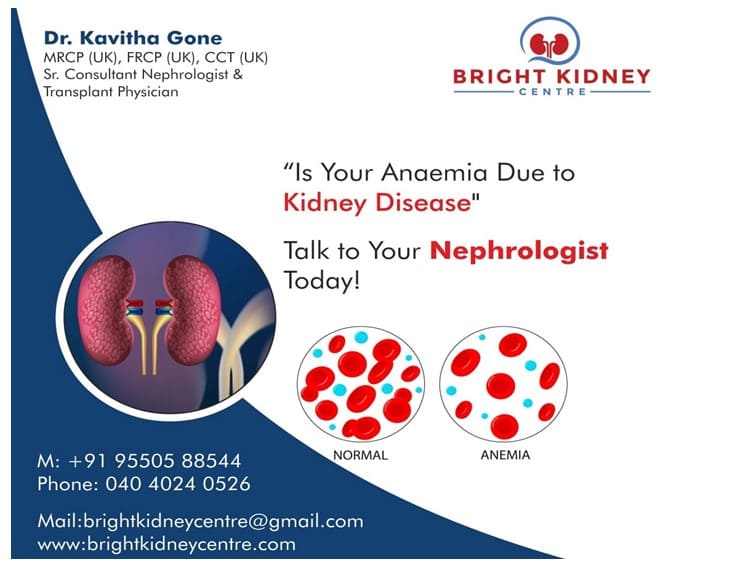Most people with kidney disease will develop anemia. Anemia can happen early in the course of kidney disease and get worse as kidneys fail.
Anemia in Chronic Kidney Disease – What is the Link?
Many people don’t know the connection or link between the health of their kidneys and optimum levels of hemoglobin, iron, and red blood cells.
A continuous process occurs in the human body where old RBCs are replaced with healthy new RBCs
Erythropoietin is a hormone produced by special cells in our kidneys. This hormone signals our bone marrow to produce new red blood cells
If you develop kidney disease for any reason, these special cells in your kidneys get damaged. They no longer produce enough Erythropoietin. Therefore, your bone marrow can’t synthesize as many RBCs as required. When more RBCs die than what your bone marrow can replace, RBCs levels and hemoglobin levels drop causing Anaemia. For this reason, you will develop weakness, fatigue, and breathlessness when you have chronic kidney disease.
If you have chronic kidney disease – Your Red Blood Cells are short-lived!
The life of red blood cells in your body is around 120 days, but when you have chronic kidney disease, they may last only for around 70 to 80 days.
Red blood cells carry oxygen to every cell and organ in the body. Your bone marrow (the soft and spongy tissue within the bones) produces red blood cells. It also needs the help of your kidneys to produce red blood cells (RBCs).
What are the signs and symptoms if you have anemia?
The symptoms associated with anemia include body aches, pale skin, weakness, fatigue, dizziness, difficulty concentrating, and breathlessness.
Is iron important for improving Haemoglobin?
You require adequate iron levels in the body to produce Haemoglobin. Iron levels are generally low in patients with kidney disease.
The reasons for low iron levels could be inadequate dietary intake, blood loss, and inefficient absorption of iron. In other words, when you lose RBCs, you lose hemoglobin and iron as well. For this reason, you will need to supplement iron either by taking iron tablets or injections to improve anemia in kidney disease
How do I know if I have anemia?
Not everyone with anemia has symptoms. If you have kidney disease, you should have a blood test to measure your hemoglobin level at least once in six months to check for anemia.
If your hemoglobin is low, it is likely you have anemia. In that case, your doctor will check to find the exact cause of your anemia and plan a treatment that is right for you.
You may develop the following types of anemia in chronic kidney disease:
- EPO deficiency: Erythropoietin (EPO) hormone deficiency-related anemia.
- Vitamin deficiency anemia: This could be due to a deficiency of vitamin B12 or folic acid (poor dietary intake or inefficient absorption)
- Iron deficiency anemia: This may be due to the deficiency of iron in the body (poor absorption of iron or blood loss).
Bottom Line
A majority of people with kidney disease don’t experience any signs and symptoms until late-stage disease. The reason: kidney disease is a silently progressive condition. Therefore, low hemoglobin levels are late-stage findings in many cases.
Diabetes, malnutrition, infection, and heart disease can also increase the risk of developing anemia.
Though anyone can develop anemia, it is a common finding in CKD patients particularly when the disease progresses.
Therefore, see your nephrologist and discuss your treatment for your kidneys and anemia if you have anemia in chronic kidney disease.

Leave a Reply